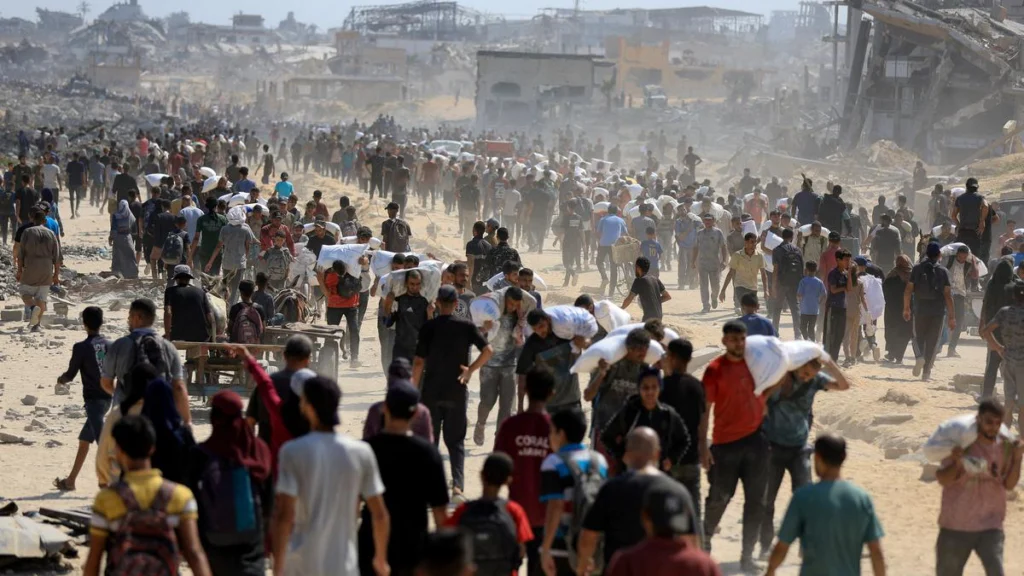At least 73 people killed waiting for humanitarian aid across Gaza, says Palestinian Health Ministry

At least 73 people died while waiting for humanitarian aid at a distribution point in Gaza, according to the Palestinian Health Ministry. More than 150 others sustained injuries, many critically. The tragic incident occurred as thousands gathered at the aid point, hoping to receive essential supplies. Hospitals reported that they are overwhelmed with casualties, and many remain in critical condition.
The Aid Distribution Incident
The incident took place at a designated aid distribution point in Gaza, where people lined up to receive food, water, and medical supplies. As the crowd grew, chaos broke out. People scrambled to secure the limited resources, resulting in a stampede. Witnesses reported seeing people crushed underfoot, unable to escape the surge of the crowd.
The lack of proper crowd control measures contributed to the disaster. People, already exhausted from living in dire conditions, were desperate to get aid. Unfortunately, the situation spiraled out of control as panic set in, and the tragic result was the death of 73 individuals.
Medical Response and Overwhelmed Hospitals
Hospitals in Gaza have been overwhelmed by the number of casualties from the stampede. Doctors and medical staff are working around the clock to treat the wounded, but medical supplies remain scarce. The hospitals are already struggling to cope with the continuous influx of injured people from the ongoing conflict. Many patients suffered from crush injuries, while others were suffocated during the stampede.
The healthcare system in Gaza is under extreme pressure, and medical staff are doing their best with limited resources. The shortage of medical supplies, including critical drugs and equipment, has made it difficult to provide adequate care to those in need.
The Growing Humanitarian Crisis in Gaza
Gaza has long been in the grip of a humanitarian crisis. A combination of economic blockades, military operations, and political instability has left the population struggling to survive. The situation has been worsening, with shortages of food, medicine, and clean water affecting millions. The ongoing conflict between Israel and Palestinian groups has made it difficult for humanitarian aid to reach those who need it most.
The recent stampede is just one example of the deadly consequences of this prolonged crisis. People are desperate, and without sufficient infrastructure or resources, they often have no choice but to risk their lives for a chance to receive the most basic of necessities.
Aid Efforts and Challenges
Humanitarian organizations have been attempting to provide aid to Gaza for years, but delivering it remains a major challenge. The blockade on Gaza, imposed by Israel, severely restricts the flow of goods and resources into the region. These restrictions, combined with the ongoing conflict, make it difficult for aid to reach those who need it most.
The international community, including the United Nations and the Red Cross, continues to call for more access to Gaza to provide aid. However, political obstacles and military tensions have hindered efforts to bring relief. Despite these efforts, the scale of the humanitarian crisis is growing, and the people of Gaza continue to suffer.
The Need for Greater International Support
In response to the increasing needs, the international community must act more decisively. Humanitarian organizations, governments, and international bodies must work together to ensure that aid reaches those in need without obstruction. The current situation in Gaza has left many vulnerable, and urgent action is required to prevent more deaths.
More resources are needed to support the victims of the stampede and to improve access to healthcare. Hospitals must be provided with adequate supplies, and medical staff need support to treat the growing number of casualties.
Additionally, international leaders must call for greater efforts to ensure that civilians are protected in Gaza. The current environment of violence and instability makes it nearly impossible for civilians to live without fear of injury, loss of life, or being trapped in desperate situations.
A Call for Political Change
While immediate relief is necessary, long-term political solutions are also required. The ongoing conflict in Gaza has been fueled by deep political divisions. The failure to address the root causes of the violence has left Gaza in a perpetual state of crisis.
The international community must push for diplomatic solutions that address both the humanitarian needs and the underlying political issues. Only through meaningful negotiations between Israel and Palestinian factions can the cycle of violence and suffering be broken. These diplomatic efforts must be supported by all parties, including regional powers, to ensure lasting peace.
The Path Forward
The loss of 73 lives in the stampede is a tragic reminder of the urgent need for action in Gaza. The international community must prioritize humanitarian aid and push for increased access to resources for those in need. At the same time, efforts to address the political situation must be intensified to prevent future tragedies.
In the coming weeks and months, humanitarian organizations will continue to provide aid, but the people of Gaza need more than just temporary relief. They need a sustainable solution to the crisis that addresses both immediate and long-term needs.
Conclusion
The recent tragedy at the aid distribution point in Gaza is a heartbreaking reminder of the ongoing humanitarian crisis in the region. At least 73 people have died, and over 150 others have been injured in the stampede, which resulted from the chaos at a much-needed aid point. The lack of proper infrastructure, limited resources, and escalating violence have made life in Gaza increasingly unbearable.
As the situation continues to deteriorate, the international community must increase its support for the people of Gaza. Both immediate humanitarian relief and long-term political solutions are necessary to prevent further loss of life. The people of Gaza have endured unimaginable suffering, and the world must step up to help end the cycle of violence and despair.






